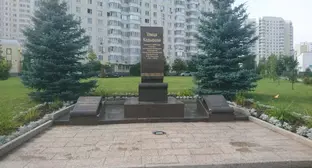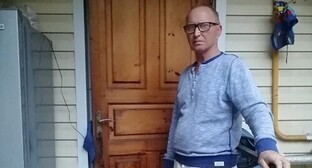15 July 2013, 15:02
Week in the Caucasus: review of main events of July 8-14
Murder of journalist Akhmednabi Akhmednabiev in Dagestan; decision of Russia's Supreme Court to uphold ban on wearing hijabs in schools of Stavropol Territory; start of trial in Boston of Johar Tsarnaev, accused of committing a terror act during marathon race; start of nominating presidential candidates in Georgia; a public hearing on the reconstruction project of Volgograd embankment; end of international film festival "Golden Apricot" in Armenia, – look these and other events in the Caucasus in the review of the week of July 8-14, 2013, prepared by the"Caucasian Knot".
Dagestan: murder of journalist Akhmednabi Akhmednabiev
In the morning on July 9, in the village of Semender, Kirov District of Makhachkala, Akhmednabi Akhmednabiev, a "Caucasian Knot" correspondent, was shot dead by unidentified persons. The received wounds caused his immediate death. Investigators view his professional activities as the top priority version of the murder. On the same day after the mourning ceremony in the mosque of Makhachkala, the funeral procession carried Akhmednabiev's body across the central square of the city and took it to his native village of Karata, Akhvakh District of Dagestan, where the journalist was buried.
Ramazan Abdulatipov, the acting head of Dagestan, said that he would supervise the investigation into Akhmednabiev's murder; a similar intention – to control the course of investigation – was expressed by Vsevolod Bogdanov, the chairman of the Union of Journalists of Russia. The Amnesty International and the "Reporters without Borders" have pointed to the association of Akhmednabiev's murder with his professional activities; and the organization Civil Rights Defenders has demanded an immediate investigation into Akhmednabiev's murder. The MPs of the Russian State Duma have expressed a need for toughen the penalties for the violence used against mass media workers and have already prepared a respective bill.
Akhmednabi Akhmednabiev wrote about massive human rights violations, crimes committed by power agents in Dagestan, and persecution of entire religious communities. He received numerous threats. Earlier this year, on January 11, unidentified assailants already tried to kill him; however, the bullet then passed by, and the journalist remained safe and sound.
Stavropol Territory: Russian SC finds ban on hijabs in schools lawful
On July 10, the Collegium of the Supreme Court (SC) of the Russian Federation rejected the appeal complaint against the decision of the Stavropol Territorial Court on the lawsuit filed against the territorial government in connection with the ban imposed by the latter on wearing hijabs in schools. The lawsuit was lodged, on behalf of three residents of the village of Irgakly, Stavropol Territory, by the lawyer Murad Musaev, after on March 22 the above Territorial Court dismissed his lawsuit demanding to annul the government's resolution of October 31, 2012, "On Approval of Basic Requirements for School Uniform and Appearance of Schoolchildren", in the part that prohibits schoolgirls from wearing religious clothes, religious attributes and headgear. Immediately after the verdict passed by the SC, Musaev announced his intention to appeal against it.
Boston starts trying Johar Tsarnaev accused of committing terror act
On July 10, the United States began the trial of a native of Chechnya Johar Tsarnaev, who is accused of committing a terror act in Boston on April 15. Tsarnaev pled non-guilty on any of the 30 points of the indictment. The hearing lasted for about 20 minutes. The prosecution has not decided on the punishment to be requested for the defendant, who appeared in the courtroom in prison garb and with his arm in plaster. The victims refused to speak. The first court session was held at the background of actions held by two groups of local residents – supporters and opponents of Tsarnaev.
Georgia: initiative groups start nominating presidential candidates
The Central Election Commission (CEC) of Georgia accepts applications from those who want to run for presidency in Georgia at the election appointed for October 27. On July 11, the CEC reported about the following candidates: Michael (Gela) Saluashvili, Tariel Khvedelidze, Nestan Kirtadze, Georgy Gakhokiya, Mamuka Chokhonelidze and Nikoloz Gorgidzhanidze. The oppositional Labour Party has nominated its leader Shalva Natelashvili as a presidential candidate. On July 12, Georgy Targamadze, the leader of the oppositional Christian-Democratic Movement, announced his intention to take part in the race.
The "United National Movement" Party that is supporting Saakashvili is going to choose its candidate through primaries. The ruling coalition "Georgian Dream" has nominated Georgy Margvelashvily, the Minister of Education and Sciences of Georgia, as its candidate. Besides, Salome Zurabishvili, the former Foreign Minister, and Nino Burdjanadze, the former Speaker of the Parliament and now the leader of the "Democratic Movement-United Georgia", had earlier expressed their intention to run for presidency.
Volgograd: fate of the city's main embankment decided at public hearing
On July 11, Volgograd held a public hearing on the project of the embankment, where 700 persons got registered as participants. Therefore, the hall of the former cinema "Rodina" with its 180 seats was unable to house everybody. The nationalists Anatoly Boltykhov and Mikhail Yasin called not to hold the event, once all the willing persons cannot be present. However, the event took place and presented the winner of the contest defined on August 26, 2012. The approval of the project was voted for by 430 people, with 50 votes cast against. Let us note here that several protest actions were held against the project of reconstruction of the embankment in Volgograd, where the participants stated that the project assumes new construction, which has nothing to do with the existing one.
Armenia: international film festival "Golden Apricot" is over
On July 13, Yerevan hosted the closing ceremony of the 10th International Film Festival "Golden Apricot", which was launched on July 7. The main festival prize in the "Feature Films" nomination was given to the movie by a Serbian film director Srdjan Golubovich "The Core". The success of the "Golden Apricot'' is in its interesting guests and good films, Krzysztof Zanussi, a Polish film director and one of the honoured guests of the festival, has noted.
The festival presented a special pilot programme "Days of Russian Cinema" and defined the winners of the film platform "Armenia-Turkey" and the regional forum "Film Directors without Borders".




